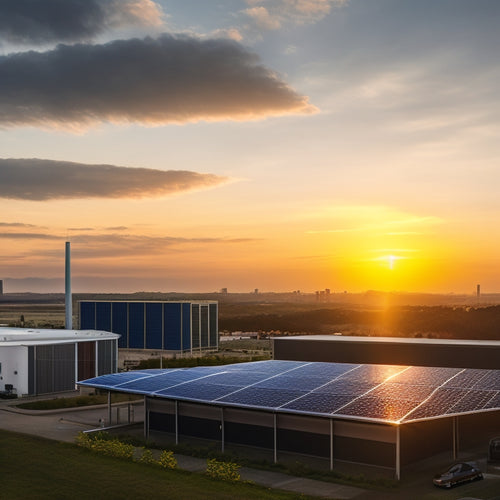
Price of Battery for Solar System
Share
When you're considering a solar system, the cost of the battery is an essential factor, as it can account for up to 30% of the total system cost, and selecting the right one can greatly impact your energy savings and overall return on investment. You'll need to evaluate factors like energy storage capacity, depth of discharge, and lifespan to determine the most cost-effective solution. Financing options and government incentives can also help mitigate initial costs. By understanding the key characteristics of different battery types and their benefits, you can make an informed decision that suits your needs and budget - and uncover more ways to maximize your solar system's potential.
The Essentials
- Evaluating battery types (lead-acid, lithium-ion, nickel-cadmium) aids in budget planning for solar systems, as each has varying price points.
- Assessing depth of discharge (DOD), round-trip efficiency, and lifespan is crucial for cost-effectiveness and optimal battery performance in solar systems.
- Financing options and government incentives can mitigate initial costs of batteries for solar systems, making them more affordable.
- The amp-hour rating of a battery determines its energy storage capacity, which affects the overall price of the solar system.
- Budget-friendly approaches, such as considering battery lifespan and maintenance needs, enable clean energy generation while controlling expenses for solar systems.
Boosts Renewable Energy Savings
You can maximize your renewable energy benefits by incorporating a battery into your solar system, allowing you to store excess energy generated during the day for use during periods of low sunlight or at night.
This setup provides a cost-effective solution by reducing your reliance on the grid and minimizing energy waste.
By leveraging advanced home power backup systems, you can guarantee a seamless supply of power even during outages.
Renewable Energy Benefits
Renewable energy savings receive a notable enhancement from the integration of solar systems, primarily due to the reduced reliance on fossil fuels and lower operating costs.
You'll benefit from decreased energy expenditures, which can be allocated towards more pressing needs. Additionally, solar systems qualify for various solar incentives, such as tax credits and rebates, which can greatly offset the initial investment.
By opting for a home solar power battery, you can store excess energy generated by your solar panels during the day, enabling you to power your home at night or during power outages without incurring additional costs off-grid solar batteries. This innovative solution allows you to enjoy reduced energy expenses, uninterrupted power supply, and the freedom to be less reliant on the grid, providing a cleaner, more sustainable, and self-sufficient lifestyle.
By shifting to a solar-powered system, you'll not only reduce your energy bills but also contribute to a cleaner environment.
The environmental impact of fossil fuels is well-documented, and solar energy offers a cleaner, more sustainable alternative. You'll be reducing your carbon footprint, minimizing air pollution, and helping to combat climate change.
The benefits of renewable energy extend beyond financial savings, as you'll also be promoting energy independence and reducing reliance on non-renewable energy sources.
Cost-Effective Solutions
Optimizing energy storage is vital in maximizing the benefits of solar systems, and a key aspect of this is the price of battery for solar system integration. You need to evaluate affordable options that align with your budget planning to guarantee a seamless integration.
A cost-effective solution is to investigate different battery types, such as lead-acid, lithium-ion, and nickel-cadmium batteries, each with its unique characteristics and price points. By choosing the right battery type, you can minimize your upfront costs and maximize your renewable energy savings.
For instance, a deep cycle battery for solar can provide a stable source of backup power during outages, allowing homeowners to store excess energy generated during the day for use at night or on cloudy days.
When assessing cost-effective solutions, you should also evaluate the battery's depth of discharge (DOD), round-trip efficiency, and lifespan. These factors will help you determine the most economical option for your solar system.
Additionally, you may want to investigate financing options or government incentives that can help offset the initial investment. By adopting a budget-friendly approach to energy storage, you can enjoy the freedom to generate clean energy while keeping your costs in check.
Increases Off-Grid Energy Independence
You're looking to maximize your off-grid energy independence with a solar system, and that's where a battery comes in.
By increasing your energy storage capacity, you'll be able to store excess energy generated by your solar panels during the day for use during the night or on cloudy days.
With systems like the Tesla Powerwall and LG Chem RESU solar energy storage systems, you can enjoy a reliable and efficient energy storage solution.
This, in turn, enhances the reliability of your renewable power, ensuring you have a steady supply of energy even when the grid is unavailable.
Energy Storage Capacity
With the increasing adoption of solar power systems, energy storage capacity has become a critical component in enhancing off-grid energy independence. You're not just generating electricity; you're storing it for later use. This allows you to power your home or business during the night or on cloudy days, reducing your reliance on the grid.
When evaluating energy storage capacity, consider your battery's lifespan. A longer lifespan means fewer replacements, reducing your overall system cost. Look for batteries with a high depth of discharge (DOD), as they can store more energy per charge. This increases your energy efficiency, allowing you to get the most out of your solar panels.
When choosing a battery, consider your energy needs and the size of your solar array. A larger battery bank can store more energy, but it also increases your upfront cost.
You'll need to strike a balance between energy storage capacity and cost. By selecting the right battery for your system, you can achieve true energy independence and freedom from the grid.
Renewable Power Reliability
Renewable Power Reliability (Increases Off-Grid Energy Independence)
Frequently, renewable power reliability is the deciding factor in achieving off-grid energy independence. You need a system that can consistently provide power, regardless of external factors like weather or grid outages. When you invest in a solar system with a high-performance battery, you're guaranteeing a reliable source of energy. This means you can power your home, farm, or business without relying on the grid.
Solar integration is key to achieving renewable power reliability. By combining your solar panels with a battery designed for solar applications, you can store excess energy generated during the day for use at night or during periods of low sunlight.
This guarantees a stable and consistent flow of power, even when the sun isn't shining. With a reliable solar system, you can enjoy the freedom and independence that comes with generating your own clean energy.
Deep Cycle Battery Benefits
You'll find that deep cycle batteries offer significant benefits, particularly when it comes to their longer cycle life and reduced maintenance needs.
They're ideal for home solar panel battery systems, as they provide a reliable source of energy storage.
With a longer cycle life, you won't need to replace your batteries as frequently, which can save you money in the long run.
Additionally, reduced maintenance needs mean you'll spend less time and effort keeping your system running smoothly.
Longer Cycle Life
A deep cycle battery's longer cycle life is a significant advantage, as it directly impacts the overall cost of your solar system.
You'll benefit from a longer period of reliable performance, reducing the need for frequent replacements. This means you'll save money in the long run, as you won't need to purchase new batteries as often.
A longer cycle life also translates to better lifetime performance.
Deep cycle batteries are designed to handle the demands of your solar system, and they'll continue to perform well even after hundreds of charge and discharge cycles. This is in contrast to standard batteries, which may experience significant battery degradation over time.
With a deep cycle battery, you can expect a consistent level of performance throughout its lifetime.
When you invest in a deep cycle battery, you're investing in a reliable source of energy for your solar system.
You'll enjoy a longer period of freedom from the grid, without worrying about your battery's performance.
Reduced Maintenance Needs
The reduced maintenance needs of a deep cycle battery are a significant benefit for solar system owners. You'll appreciate the freedom from frequent maintenance checks, allowing you to focus on more important aspects of your life. With deep cycle batteries, you can enjoy a longer battery lifespan and reduced maintenance frequency.
| Battery Type | Maintenance Frequency | Battery Lifespan |
|---|---|---|
| Flooded Lead-Acid | Every 3-6 months | 5-7 years |
| AGM (Absorbed Glass Mat) | Every 6-12 months | 7-10 years |
| Deep Cycle | Every 12-18 months | 10-15 years |
As you can see, deep cycle batteries require less frequent maintenance compared to other battery types. This means you'll have more time to enjoy the benefits of your solar system, without worrying about constant checks and upkeep. With a longer battery lifespan, you'll also reduce the need for premature replacements, saving you money in the long run. By choosing a deep cycle battery, you're investing in a more convenient and cost-effective solution for your solar system.
Consider Amp-Hour Rating First
When selecting a battery for your solar system, you'll need to take into account the amp-hour rating first. This critical specification determines how much energy your battery can store, and there are different calculation methods to guarantee you get an accurate rating.
For instance, the Tesla Powerwall and LG Chem RESU home energy storage solutions have varying capacities, which affect their amp-hour ratings.
You'll also need to take into account the type of battery you're using, as different types have varying amp-hour ratings.
Amp-Hour Calculation Methods
By diving into the world of solar systems, you'll quickly realize that calculating the required battery capacity is vital for a reliable and efficient setup.
Accurate amp-hour calculation methods are key to guarantee your solar system operates within its design parameters.
To determine the required battery capacity, you'll need to estimate your daily energy usage in amp-hours (Ah). The amp hour formula is: Total Daily Load (in Watt-hours) / System Voltage / Depth of Discharge (DOD) = Required Battery Capacity (in Ah).
For example, if your daily load is 1200Wh, system voltage is 12V, and DOD is 0.5, your required battery capacity would be approximately 200Ah.
Capacity estimation involves taking into account factors such as autonomy days, temperature derating, and battery efficiency.
It's vital to take these factors into account to guarantee your solar system can provide the required energy during periods of low sunlight or power outages.
Battery Type Considerations
Most solar systems rely on deep cycle batteries, which come in various types, each with unique characteristics that impact their suitability for your solar setup.
You'll need to evaluate the pros and cons of each type to guarantee you're getting the right fit.
You've likely narrowed down your options to lithium-ion or lead-acid batteries.
Lithium-ion batteries boast several advantages, including higher energy density, longer lifetimes, and lower self-discharge rates. This means you'll get more power per pound and less maintenance hassle.
Additionally, lithium-ion batteries are more environmentally friendly, as they contain fewer toxic materials.
On the other hand, lead-acid batteries, while relatively inexpensive upfront, come with significant drawbacks.
They're heavier, bulkier, and have shorter lifetimes, requiring more frequent replacements.
Lead-acid batteries also have lower energy density, which can lead to reduced performance and efficiency.
Moreover, they contain toxic materials that can harm the environment if not disposed of properly.
Evaluating the lithium advantages against the lead acid drawbacks will help you make an informed decision about which battery type is best for your solar system.
Longer Cycle Life Guaranteed
You'll want to look for batteries that can handle a higher depth of discharge (DOD) if you want a longer cycle life guaranteed.
A higher DOD means the battery can be drained further before recharging, which reduces wear and tear.
Higher Depth of Discharge
In conjunction with the battery's charging cycles, the depth of discharge (DOD) plays a critical role in determining its overall lifespan.
You'll want to maximize your battery's efficiency by allowing it to discharge to a higher DOD, which means you're using more of the battery's capacity. This approach can greatly reduce the number of charging cycles required, ultimately leading to a longer lifespan.
As you opt for a higher DOD, you'll notice an increase in discharge rates. This means your solar system can provide power for a longer period, giving you more freedom and flexibility.
By choosing a battery with a higher DOD, you're fundamentally getting more bang for your buck. You'll enjoy a more efficient system that requires less maintenance and replacement, saving you time and money in the long run.
When selecting a battery for your solar system, look for options with a higher DOD rating. This will guarantee you're getting the most out of your investment and enjoying the benefits of a longer-lasting, more efficient system.
With a higher DOD, you'll experience improved battery efficiency, reduced maintenance, and a greater sense of freedom and independence from the grid.
Frequently Asked Questions
What Is the Average Cost of a Battery for a Solar System?
You'll find that the average cost of a battery for your solar system depends on the type, such as lead-acid, lithium-ion, or flow batteries, and installation costs, ranging from $5,000 to $20,000 or more, depending on your energy needs.
Can I Use a Car Battery for My Solar Panel System?
You're considering using a car battery for your solar panel system, but it's not the most ideal choice; car batteries aren't designed for deep-cycle use, which can reduce solar panel efficiency, and their compatibility is limited for off-grid systems.
How Long Does It Take to Charge a Solar Battery?
Don't worry about sacrificing charging efficiency; you're using a solar battery, not a car battery. You'll typically charge your solar battery in 5-8 hours, depending on capacity, but be aware that frequent deep discharges can reduce its lifespan.
Are Solar Batteries Affected by Extreme Temperatures?
You'll find that solar batteries are indeed affected by extreme temperatures, which can impact their lifespan; high temps accelerate degradation, while low temps reduce charging efficiency, so it's essential to take into account temperature effects when selecting and installing your battery.
Can I Mix Old and New Solar Batteries in a System?
You're considering mixing old and new solar batteries, but beware: incompatible batteries can reduce overall performance. Check battery compatibility to guarantee seamless integration, as performance differences between old and new batteries can lead to system inefficiencies.
Final Thoughts
As you consider the price of a battery for your solar system, remember that investing in a high-quality deep cycle battery will enhance your renewable energy savings and increase your off-grid energy independence. With a longer cycle life guaranteed, you'll enjoy reduced maintenance costs and a lower carbon footprint. Did you know that a single deep cycle battery can provide up to 5,000 charge cycles, translating to over 13 years of reliable service?
Related Posts
-

Building an Emergency Backup Solar Power System in 5 Essential Steps
Building an emergency backup solar power system involves five key steps. First, assess your daily energy needs to ide...
-

What Happens Without a Charge Controller in Solar Panels
Without a charge controller in your solar panel system, you risk overheating batteries due to overcharging, which can...
-

Advantages of Commercial Solar Battery On-Site Storage
By investing in a commercial solar battery on-site storage system, you can greatly reduce your energy grid dependence...


